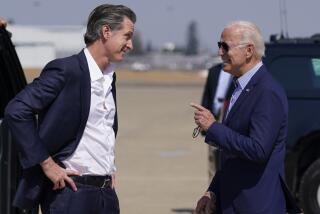Santorum clears path for Romney
GETTYSBURG, PA. — Rick Santorum’s decision to leave the Republican presidential race boosted two candidacies: Mitt Romney was spared two more weeks of struggle before he could be crowned the presumptive nominee even as Santorum set the stage for a future run for office.
Santorum’s announcement Tuesday that he would suspend his campaign effectively ended a bruising intraparty clash that many feared was harming Republicans’ ability to take on President Obama in the fall. Though Romney remains a distance from the 1,144 delegates needed to claim the nomination, he can now turn his full attention to combating his general election opponent.
Santorum emerged from the contest far stronger than he entered it, having transformed himself from a political has-been to a leader of the party’s evangelical and non-establishment wings. The youngest candidate in the field at 53, he left as the second-place finisher, a position from which he could mount a serious effort in 2016 or 2020.
In a poignant closing speech, Santorum acknowledged the unlikelihood of his insurgent campaign winning.
“This race was as improbable as any race that you will ever see for president. I want to thank God for that and I want to thank all of you,” said Santorum, surrounded by his wife, Karen, and four of their seven children at the Gettysburg Hotel. “Thank all of you across this country for what you have given ... which is a voice to those who are, in many cases, voiceless. And we have tried to be a witness not just for your stories and your voice, but to provide a positive and hopeful vision, not a negative campaign.”
He would, Santorum said, “continue to fight for those voices.”
Santorum alluded to months spent campaigning, either anonymously, nearly broke and almost alone or -- later -- with a semblance of an entourage as his candidacy gained strength.
“It was a love affair for me going from state to state and seeing the differences, but seeing the wonderful, wonderful people of this country who care deeply about where this country is going in the future, who care deeply about those who are out there paddling alone, who are feeling left behind, and in some respects feeling hopeless and want to do something,” he added.
The former Pennsylvania senator, who has bitterly criticized Romney as too similar to Obama on issues such as healthcare, gun control and climate change, did not mention Romney during his remarks. Aides said later that he spoke to the front-runner on the phone shortly before he announced his decision and that they would meet in person soon, at Romney’s request.
Although Rep. Ron Paul and former House Speaker Newt Gingrich remain candidates, Santorum was the only realistic obstacle to Romney claiming the nomination. His absence means that Romney will not have to face a contested April 24 primary in Pennsylvania, a battleground state in the fall and one which Santorum represented in Congress.
That will spare him discussion of some of the controversial social issues that Santorum brought to the forefront of the Republican race and that have turned off independents and moderates who are key to a November victory.
“This is just a great news day for the Romney campaign,” said Steve Duprey, a nonaligned New Hampshire campaign veteran. “Now he doesn’t have to worry about defending his flank.”
Romney seconded the sentiment at a campaign event in Wilmington, Del.
“This has been a good day for me,” Romney said to applause from a subdued crowd. “Sen. Santorum has decided not to proceed with his campaign, and I had the chance to speak with him this morning. We exchanged our thoughts about going forward, and we both have a great deal of interest in seeing the country taken on a very different path. He has made an important contribution to the political process.”
In the beginning, that did not seem possible for Santorum, who lost his Senate reelection campaign in 2006 by 17 percentage points.
Largely ignored as he drove past the cornfields of Iowa in a pickup, Santorum doggedly met with voters at diners, farms and county fairs. Sometimes only one voter would show up, but he kept plugging away, holding nearly 400 events across the state’s 99 counties.
That work paid off in a surprise win in Iowa and in 10 other states as he became the physical manifestation of the GOP base’s unhappiness with Romney. But in states where he could have blunted Romney’s march, he fell to a barrage of negative ads from the flush Romney operation. Santorum’s ill-funded team had neither the resources nor the organization for important basics like filling slates of delegates, meaning that even in states he won he could not fully shake Romney.
Santorum’s decision came as key GOP figures had begun to coalesce behind the former Massachusetts governor, arguing that it was time for the party to focus on beating Obama.
Speaking to reporters and declining to take questions, Santorum did not directly address why he was leaving the race, but said the decision had been made around the kitchen table, where the family had also decided to enter the contest.
The announcement came after a five-day hiatus from the campaign trail. He initially took the break to spend the Easter weekend with his family and to celebrate his oldest child’s 21st birthday, but on Friday his youngest child, Bella, was hospitalized with pneumonia. The 3-year-old, who suffers from a rare chromosomal disorder, returned home Monday. Santorum alluded to his daughter’s illness in announcing his decision.
“We had a difficult weekend,” Santorum said. But “she is a fighter and she is doing exceptionally well and is back with us and the family. And we are looking forward to spending a lot of great time with her. But it did cause us to think.”
In an email to supporters, Santorum offered a more explicit political rationale, saying he did not see a path to the nomination unless Texas changed its upcoming primary to award delegates in a bloc to the winner rather than proportionally, an unlikely scenario.
Ohio Atty. Gen. Mike DeWine, who switched his endorsement from Romney to Santorum in February ahead of his state’s primary, said Santorum would play a prominent role in the party’s future and in the fall campaign.
“He will go to the convention as a major player, and he’s clearly won himself an awful lot of friends for the future,” said DeWine, who served the same two U.S. Senate terms as Santorum. “He energizes our base. He brings people into our party who have sat on the sidelines in the past. He’ll be invaluable.”
Chuck Laudner, a veteran Iowa political operative who drove Santorum around the state, also predicted a bright future for the candidate, and possibly another presidential run.
“If we wake up in January and Barack has taken his oath, people are going to be screaming for Rick Santorum,” Laudner said. “They’ll remember the feel-good story of 2012, the enthusiasm and the energy.”
Some supporters were left not only disappointed but lukewarm in their support for the presumptive nominee.
“I am sad,” said Alexia Newman, who runs a crisis pregnancy center in Greenville, S.C., and served as Santorum’s liaison to evangelical pastors there. “There’s been an enthusiasm gap for Romney from the get-go. We will work for him. But we just had so much enthusiasm for Santorum and what he stood for -- his character, his integrity.”
Times staff writers Robin Abcarian, Maeve Reston and Paul West contributed to this report.
More to Read
Get the L.A. Times Politics newsletter
Deeply reported insights into legislation, politics and policy from Sacramento, Washington and beyond. In your inbox three times per week.
You may occasionally receive promotional content from the Los Angeles Times.











